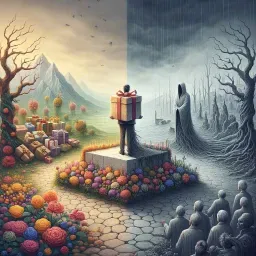They do not love that do not show their love

0
0
0
0
- Meaning
- At its core, the phrase "They do not love that do not show their love" emphasizes the importance of expressing one's feelings of love. It suggests that love is not just an internal feeling but also an external expression. Without showing love through actions or words, the sincerity of one's feelings can be questioned. This touches upon fundamental human needs for recognition and affirmation in relationships.
- Allegory
- The serene, sunlit garden represents a nurturing space where love can flourish. The blooming flower offered as a gesture symbolizes a tangible expression of love, while the gentle acceptance signifies the reciprocation of such feelings. The vibrant flowers and singing birds create an atmosphere of joy and harmony, aligning with the idea that love's expression leads to a thriving and blissful environment. The soft, warm light bathing the scene highlights warmth and positivity, reinforcing the phrase's message that showing love enriches and brightens human connections.
- Applicability
- The phrase can be applied to everyday life by reminding individuals to demonstrate their love through tangible actions rather than merely having affectionate feelings. Whether it's through kind gestures, words, or acts of service, showing love helps strengthen bonds and assures the loved ones of their importance and value.
- Impact
- The impact of this phrase is significant in literature and everyday life. Shakespeare's works have deeply influenced the Western conception of love, duty, and human relationships. This particular notion—that love must be shown to be genuine—has permeated various cultural expressions, from literature to popular media, reinforcing the idea that love's true value lies in its expression.
- Historical Context
- This phrase likely originates from the Elizabethan era, around the late 16th to early 17th century, aligning with the literary period when Shakespeare was active. The Elizabethan period was marked by a flourishing of the arts and a deep exploration of human emotions in literature.
- Criticisms
- One possible criticism is that the phrase might imply that those who struggle with outward expressions of love do not genuinely love, which might not always be true. People have different ways of expressing their feelings, and some may find it challenging to show love openly due to personal or psychological reasons. This could lead to misconceptions and unfair judgments about one's capacity for love.
- Variations
- Variations of this phrase might be found in different cultures, with each emphasizing the significance of showing love and kindness. For example, in some Eastern cultures, love is often shown through acts of service and care rather than vocal declarations. Understanding cultural nuances in expressions of love can broaden the interpretation of this phrase.
-

The empty vessel makes the loudest sound.
-

O, had I but followed the arts!
-

Rich gifts wax poor when givers prove unkind.
-

Give me my robe, put on my crown; I have immortal longings in me.
-

They stumble that run fast.
-

The golden age is before us, not behind us.
-

What light through yonder window breaks?
-

I am one who loved not wisely but too well.
-

The evil that men do lives after them; the good is oft interred with their bones.
-

A friend should bear his friend's infirmities, but Brutus makes mine greater than they are.
No Comments